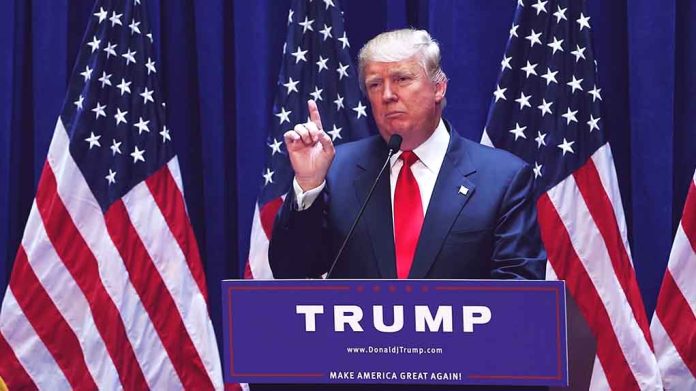
President Trump strikes a strategic balance by allowing Chevron to maintain its $7 billion in assets in Venezuela while continuing the ban on oil imports, cutting off crucial revenue to the corrupt Maduro regime.
Key Takeaways
- The Trump administration has issued a narrowly tailored waiver allowing Chevron to maintain its infrastructure in Venezuela but prohibiting oil imports and exploration.
- President Trump imposed a 25% tariff on countries importing Venezuelan oil, targeting India, China, Spain, and Italy to increase pressure on the Maduro regime.
- Special Envoy Ric Grenell’s negotiations with Venezuela occurred without initial coordination with the State Department, causing internal policy friction.
- The policy aims to protect American business assets while simultaneously cutting off financial support to Maduro’s government until democratic processes are restored.
- Maduro’s regime has increased political repression, arresting opponents following announcements about Chevron’s license expiration.
Trump Balances Business Protection and Regime Pressure
The Trump administration has implemented a carefully calibrated approach to Venezuela policy, permitting Chevron to maintain its approximately $7 billion in assets within the country while simultaneously upholding a ban on Venezuelan oil imports. This strategic decision enables the American energy giant to perform essential maintenance and protect its infrastructure investments without providing financial benefits to President Nicolas Maduro’s regime. The narrowly tailored sanctions waiver specifically prohibits energy exploration activities, ensuring Chevron’s physical assets remain secure while adhering to broader U.S. policy goals of isolating the Venezuelan government economically.
“It will be renegotiated so that Chevron equipment can remain, but no (money) for Maduro, which was the issue,” said a senior White House official.
Broader Economic Sanctions Target Maduro’s Supporters
President Trump has reinforced his stance against the Venezuelan government by implementing a 25% tariff on oil and gas imports from countries purchasing Venezuelan crude, effective April 2. This measure specifically targets nations including India, China, Spain, and Italy that continue to rely on Venezuelan oil despite international pressure. The tariffs represent a significant escalation in Trump’s use of economic leverage as a foreign policy tool, designed to isolate Maduro’s government by making its oil exports less attractive to international buyers and reducing the regime’s access to hard currency.
“very hostile to the United States,” said Donald Trump, regarding Venezuela’s actions.
These sanctions reflect Trump’s commitment to addressing Venezuela’s political crisis through economic pressure. The tariffs will remain in effect until a country completely ceases importing Venezuelan oil for at least one year, though the administration maintains the flexibility to revoke the measure earlier if policy objectives are achieved. For countries like India, this presents significant challenges, potentially requiring adjustments to oil procurement strategies and possibly increasing imports from alternative sources such as Russia to offset rising costs.
Internal Policy Dynamics and Diplomatic Efforts
The development of this Venezuela policy has not been without internal friction. Special Envoy to Venezuela Ric Grenell attempted to negotiate more favorable terms for Chevron, including the ability to sell Venezuelan oil, by securing the release of an American detainee. However, these negotiations were not initially communicated to the State Department or White House, creating surprise and policy misalignment within the administration. Grenell reportedly plans to continue lobbying for the restoration of Chevron’s oil import rights, potentially after Secretary of State Marco Rubio’s tenure concludes.
“That’s a long wait,” commented a source close to the president regarding Grenell’s plan to wait for Secretary Rubio’s tenure to end before pursuing policy changes.
Maduro’s Escalating Repression Justifies Tough Stance
The Trump administration’s firm position on Venezuela comes as Maduro’s regime has intensified its crackdown on political opposition. Following the announcement of Chevron’s license expiration, Venezuelan authorities arrested political opponents, demonstrating the regime’s ongoing authoritarianism. Additionally, Venezuela’s electoral council recently claimed a landslide victory for Maduro’s party in elections widely boycotted by opposition parties and criticized by international observers. These actions reinforce the necessity of maintaining economic pressure as a tool to promote democratic change.
“This termination executes on the President’s directive and cuts off financial lifelines for a regime that has consistently stolen elections, pillaged from its people, and colluded with our enemies,” stated the State Department regarding the policy.
President Trump’s revocation of licenses for US-based businesses in Venezuela, combined with targeted tariffs on countries importing Venezuelan oil, represents a comprehensive approach to addressing the Venezuelan crisis. By allowing Chevron to protect its assets while preventing financial flows to the Maduro regime, the administration balances American business interests with strategic foreign policy objectives. The policy underscores Trump’s commitment to using economic tools to advance democratic governance and protect American interests abroad.





